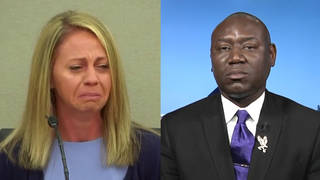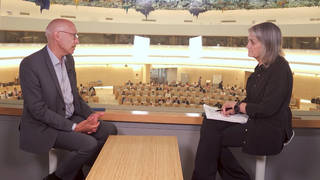
Guests
- Maya Schenwareditor-in-chief of Truthout and author of Locked Down, Locked Out: Why Prison Doesn’t Work and How We Can Do Better.
Last Friday, an African-American woman was returning home from a job interview in Waller County, Texas, when she was stopped by police. Apparently, she had improperly signaled a lane change. Two days later, the woman, Sandy Bland, was found dead in a jail cell. A video taken by a bystander during the arrest shows Bland shouting that the officer had slammed her head into the ground. According to police, Sandra Bland was taken into custody and charged with “assault of a public servant.” On Monday, police say Bland was “found in her cell not breathing from what appears to be self-inflicted asphyxiation.” The announcement was made by Waller County Sheriff Glenn Smith. Meanwhile, reports have emerged that Smith was fired from his previous post as chief of police of Hempstead, Texas, amidst accusations of racism. Bland’s friends and family contest Smith’s account, saying the thought of her committing suicide by hanging is “unfathomable.” Social media is now ablaze with people demanding answers about Sandra Bland’s death. The hashtag #SandraBland is now trending on Twitter, edging out the Emmys as a topic of discussion. We speak to Maya Schenwar, editor-in-chief of Truthout and author of “Locked Down, Locked Out: Why Prison Doesn’t Work and How We Can Do Better.”
Transcript
JUAN GONZÁLEZ: Last Friday, an African-American woman was returning home from a job interview in Waller County, Texas, when she was stopped by police. Apparently, she had improperly signaled a lane change. Two days later, the woman, Sandy Bland, was found dead in a jail cell. A video taken by a bystander during the arrest shows Bland shouting that the officer had slammed her head into the ground.
SANDRA BLAND: You just slammed my head into the ground! Do you not even care about that? I can’t even hear! You slammed me into the ground and everything! Everything!
JUAN GONZÁLEZ: According to police, Sandra Bland was taken into custody and charged with “assault of a public servant.” The next morning, police say she was “found in her cell not breathing from what appears to be self-inflicted asphyxiation.” The announcement was made by Waller County Sheriff Glenn Smith. Meanwhile, reports have emerged that Smith was fired from his previous post as chief of police of Hempstead, Texas, amidst accusations of racism. Bland’s friends and family contest Smith’s account, saying the thought of her committing suicide by hanging is “unfathomable.” This is Cheryl Nanton and LaVaughn Mosley, Bland’s friends, followed by her sister, Sharon Cooper.
CHERYL NANTON: I do suspect there was foul play, and I believe that we all are 100 percent in belief that she did not do harm to herself.
LAVAUGHN MOSLEY: We’re very suspicious. And we’re a very tight community, and we’re very upset that this is happening, and it seems like there’s nothing really being done about it.
SHARON COOPER: Each one of us feels like we lost a part of ourself. And it’s hard. It’s going to be hard for a very long time.
AMY GOODMAN: Sandra Bland was 28 years old. She was an outspoken member of the Black Lives Matter movement. She produced a series of videos called “Sandy Speaks” in which she discussed social justice and racism on her Facebook page.
SANDRA BLAND: I want the white folks to really understand out there, black people are truly—we’re doing as much as we can. Not all of us, but some of us are really doing as much as we can. And we can’t help but get [bleep] off when we see situations where it’s clear the black life didn’t matter. For those of you questioning why was he running away, well, [bleep], because in the news that we’ve seen as of late, you could stand there, surrender to the cops and still be killed.
AMY GOODMAN: Social media is now ablaze with people demanding answers about Sandy Bland’s death. The hashtag #SandraBland is now trending on Twitter, edging out the Emmys as a topic of discussion.
We’re still with Maya Schenwar, editor-in-chief of Truthout, author of Locked Down, Locked Out: Why Prison Doesn’t Work and How We Can Do Better. Her family, Sandy’s family—Sandy herself is from Chicago, from Naperville. Maya, that’s where we’re speaking to you. Her family has gone to Texas today to retrieve her body. Can you comment on what we know at this point? We have this video, apparently, that’s just been released of her saying, “Why are you slamming my head into the ground?” She’s then taken to the local jail. That was a Monday. And then she is found dead in her cell.
MAYA SCHENWAR: Right. She spent three days in the jail, injured. Clearly, police had severely injured her. We don’t know the very specifics of that, but we know she was slammed to the ground—the video shows she was severely injured—and then left in this jail cell. And I think that definitely highlights something about our county jail system, that people who are still innocent—they haven’t been proven guilty of anything—are left, you know, until they can post bail, which was actually going to happen on Monday. Sandra’s friends were about to post her bail.
And I think the fact that we see this situation where this young black woman is pulled over for a small traffic violation, she’s thrown to the ground by police, she is severely beaten and slammed into the ground—the police, actually, actually admonished the person who is filming this horrific scene—and she’s taken to jail. And I think this demonstrates—you know, earlier, we were talking about prison reform as if it’s cut off from policing. But again, policing is the gateway to prison. And policing cannot be separated from anti-blackness. And I think this is just such a tragic and horrifying example of how that practice plays out in reality.
JUAN GONZÁLEZ: And, Maya, people often focus on the federal prison system, but the number of inmates in federal prison is dwarfed—
MAYA SCHENWAR: Right.
JUAN GONZÁLEZ: —by those who are in county and state—in state facilities.
MAYA SCHENWAR: Mm-hmm.
JUAN GONZÁLEZ: Could you—and what about the oversight in those facilities?
MAYA SCHENWAR: Yeah. So, there are about 215,000 people in federal prison at this time, and there are around 2.3 million people incarcerated in the country as a whole. And so, a lot of those are in state prisons. Again, state prison, a lot of people convicted of violent offenses, those aren’t people that Obama is addressing when he talks about this large-scale prison reform. And then we have 750,000 people in county jails. And most of those people are incarcerated pretrial. They haven’t been convicted of anything. Most of those people who are in there pretrial are there because they can’t pay their bail. They’re there because they’re poor. And we have to remember this is also a racial justice issue, that people are given higher bails generally when they’re black.
And so, we have this many-pronged system, and addressing federal prison alone isn’t going to cut it. So even though there is kind of more of a focus being zeroed in on federal prison, particularly since the president is speaking out to a certain extent, we can’t forget that Obama can’t do everything. And actually, the community level, the activism happening at the community level, is really what’s going to make those giant shifts.
AMY GOODMAN: You know, as you talked about, she was clearly severely injured. Even as she said that, “Why are you slamming my head against the ground?” she also said, “I can’t hear. I can’t hear.”
MAYA SCHENWAR: Right.
AMY GOODMAN: She’s brought into the prison. The county sheriff there, the Waller County sheriff, Glenn Smith, who made the first public comments about Bland’s in-custody death, had been fired from a past job for his actions involving alleged humiliation and mistreatment of young African-American males. In Hempstead, the place where he was the sheriff before, the City Council placed him on probation for six months and ordered him to take anger management classes. He was later fired. Maya, we have 15 seconds.
MAYA SCHENWAR: So, first of all, I would say, obviously, it’s horrifying that this person is still in his job. Secondly, I would say that it’s not always about an individual racist. This is an inherently racist system. And we have to be careful—even though this sheriff obviously shouldn’t have kept his job, we have to be careful not to term someone a bad apple and ignore the inherent anti-blackness in the system as a whole.
AMY GOODMAN: Maya Schenwar, I want to thank you for being with us, editor-in-chief of Truthout and author of Locked Down, Locked Out: Why Prison Doesn’t Work and How We Can Do Better. She was joining us from Chicago.












Media Options